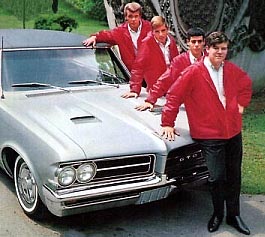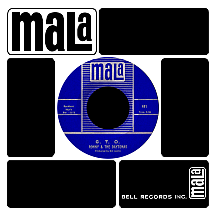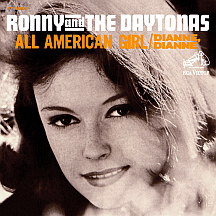RONNY AND THE DAYTONAS
G.T.O.
The muscle cars of the '60s were the ultimate toys. Teenage boys wanted one so they could be like their older counterparts: you know, those super cool, don't-mess-with-me-man, "hey girl, ya wanna go for a ride?" guys with cigarette packs rolled up in the sleeves of their T-shirts. Detroit's automakers had been upping the ante throughout the '50s with higher-performance V-8 models and in 1963 General Motors greenlit the development of a street vehicle smaller than its full size luxury line but more powerful. Pontiac executive engineer John DeLorean headed the team credited with beefing up its already-existing Tempest and renaming it the GTO (not exactly an original designation, as Italy's Ferrari company had been manufacturing its Gran Turismo Omologato as the 250 GTO for more than a year). Pontiac's hot new car, introduced late in '63 for the 1964 model year, was an instant hit.
It wasn't a surprise that Tulsa-born John Wilkin (nickname: "Bucky") sought a career in music. His mother, Marijohn Wilkin, was in a rare position for a woman, a songwriter who broke barriers in the "good ol' boy" world of 1950s country music. Her best-known compositions (all in collaboration with various male songwriters) include "Cut Across Shorty" by rocker Eddie Cochran, "The Long Black Veil" (a hit for Lefty Frizzell), "Waterloo" (likewise for Stonewall Jackson), "P.T. 109" (ditto Jimmy Dean), "I Just Don't Understand" (Ann-Margret's biggest seller) and the inspirational '70s standard "One Day at a Time" (popularized by Marilyn Sellars, Don Gibson and others). Bucky, a senior in high school in Nashville at the time Pontiac unveiled its GTO, wrote a song about the car, sprinkling the lyrics with plenty of "gearhead" slang phrases: 'Little G.T.O., you're really lookin' fine...three deuces and a four speed and a 389...listen to her tachin' up now, listen to her whi-i-ine...come on and and turn it on, wind it up, blow it out, G.T.O.!'
Here's where having a successful music-biz mom comes in handy. Marijohn started a publishing company, Buckhorn Music, with former Sun Records ace Bill Justis (of "Raunchy" fame), who produced the young Wilkin with top Tennessee session musicians and backing vocalists in a west coast style consistent with the Beach Boys-inspired surf and drag hits of the day. Bucky made up an appropriate-sounding name, Ronny and the Daytonas, leading to the inaccurate impression that an actual group existed...from Florida, home of the Daytona International Speedway, no less! "G.T.O." (flipped with "Hot Rod Baby") came out in the summer of '64 on Mala, a subsidiary of Larry Uttal's New York-based Bell Records. The guy who now had two nicknames watched as his unauthorized ode to Pontiac's in-demand muscle car spent several weeks in the top ten in September and October.
Musicians were hired to play the Daytonas to Bucky's improvised "Ronny" character. Guitarist Paul Jensen, bassist Lee Kraft and drummer Lynn Williams toured as the band but were not involved in the studio sessions; other members were added and subtracted as time passed so that effectively the group had anywhere from one to five members, depending on what week it was. General Motors, in the meantime, continued promoting its hot new product. The car's nickname became "The Tiger" after magazine ads proclaimed it was "For the man who wouldn't mind riding a tiger if someone'd only put wheels on it." We all lived in a tiger world for awhile: Enco/Esso ads claimed their gas put a "Tiger in Your Tank" and the U.S. Royal tire company manufactured "Tiger Paws," standard equipment on the GTO, "the wildest thing in Detroit." Sue Thompson ("Paper Tiger") and Buck Owens ("I've Got a Tiger by the Tail") fueled the striped-cat phenomenon with their early '65 hits. Pontiac went so far as to authorize its own record on Colpix called "GeeTO Tiger," a tame effort in comparison to Ronny's "G.T.O." by a group called - what else? - The Tigers.

Fabulous follow-up "California Bound" somehow stalled in the lower regions of the charts in November of '64. "Bucket 'T'" glorified the customized Ford Model T hot rods and did better in early '65; written by Roger Christian and Jan Berry, it was remade a few years later by unlikely renderers The Who. Around this time, James Cason (nickname: "Buzz") joined the mostly-fringe Daytonas team through his mutual acquaintance with Bill Justis. He brought a lot of experience to the table; in 1957 he was a member of Nashville band The Casuals (a different group than the Casuals from Dallas who recorded for Back Beat), with a couple of singles on Dot. He went incognito in the summer of 1960 as Garry Miles with "Look For a Star," a thinly-disguised attempt at overtaking the original version of the same song by Brit Garry Mills (it worked) while doing double duty as a member of The Statues, charting with "Blue Velvet." In '61 and '62, Buzz and Bobby Russell wrote and recorded "Tennessee" and "Popsicle" as The Todds for, oddly enough, the Todd label (both songs were later hits for Jan and Dean).
Cason and Wilkin induged in a side project for Bell's Amy label as Buzz and Bucky; "Tiger-A-Go-Go" had nothing to do with the GTO, describing instead an excursion to San Francisco that ends in a dance club called the Tiger, staffed by '...groovy dancing girls they call the Tiger Kittens.' Their songwriting collaborations brought renewed life to the next batch of Ronny and the Daytonas recordings, if only temporarily; beach girl ballad "Sandy" was a top 40 hit in January 1966. The next few singles went nowhere but the pair succeeded in getting a contract with RCA Victor. Straying again from the original car concept, label debut "Dianne, Dianne" went essentially the same route as the superior "Sandy." Of several singles for RCA, it was the only one to chart and within a year the Ronny and the Daytonas project had come to an end.
Buzz Cason continued writing songs, scoring twice with "Everlasting Love" (a hit for Robert Knight in '67 and Carl Carlton in '74). Some of the mid-'60s members of the Daytonas touring band became The Hombres, hitting big in '67 with the off-kilter "Let it Out (Let it All Hang Out)." Bucky Wilkin has regularly revived his Ronny persona on oldies tours throughout the years, fronting an ever-changing support group of nameless Daytonas; when Ronny's on stage, he's '...the grooviest thing around...little buddy, gonna shut you down...when I turn it on, wind it up, blow it out...'



